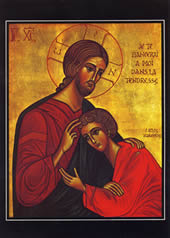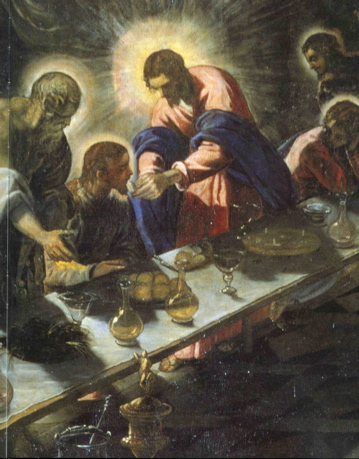Holy Thursday
The Gospel of today’s feast is taken from the Gospel of the Beloved Disciple. From within the same community a letter was written shortly afterwards, which opened with the following words:
‘We declare to you what was from the beginning, what we have heard,
what we have seen with our eyes,
what we have looked at and touched with our hands,
concerning the word of life.
This life was revealed, and we have seen it and testify to it,
and declare to you the eternal life that was with the Father and was revealed to us We declare to you what we have seen and heard
so that you also may have fellowship with us;
and truly our fellowship is with the Father and with his Son Jesus Christ.
We are writing these things so that our joy may be complete’(1John 1:1-4).
Tonight’s Gospel is a good example of something that the Beloved Disciple is sharing with us so that our joy may be complete. It was the Beloved Disciple who stood with Mary at the foot of the Cross (John 19:26-27). He was also sitting beside Jesus at the Last Supper, so close that he could lean back against Jesus’ breast and converse intimately with him (John 13:23-26).

Tonight we are drawn by grace to be present with him and the other disciples at Jesus’ last supper. Rather, we are invited by Jesus to be the Beloved Disciple, for in Jesus’ eyes that is what we are. We do this every time we come to Mass, but all other Masses simply make present at the beginning of every new week what is happening here tonight. So let us accept his invitation, be the Beloved Disciple, and take our place next to Jesus to celebrate with him this Passover meal.
This was to be Jesus’ final meal with his closest friends. He met to recall the night when God delivered their ancestors from slavery and led them to the Promised Land. But tonight there is something different about the celebration. There is a sense of foreboding. It is common knowledge that the authorities are determined to get rid of Jesus before he wins the people over: something that they feared might cause problems with the Romans. Jesus himself is aware that one of his intimate companions, for whatever reason, is to betray him. Sitting here with Jesus, we sense some of this foreboding, but he has chosen us as his adopted family and there is nowhere else we want to be. We have come to believe that Jesus is the one God has sent to liberate us from everything that separates us from love and to share with us the intimate communion with God that he enjoys.
On Mount Sinai the people under the leadership of Moses undertook to enter into a covenant with God. God would be their God and they would be God’s people. God pledged his love to them, and they pledged themselves to welcome that love and to respond. Tonight this meal is to celebrate a new and more intimate covenant. Our commitment is also more intimate. It is to love one another the way Jesus loves us, or rather, it is to allow the love he gives us to transform our hearts so that we will love others with his respect, intimacy and gentleness. He is showing his love for us right through to the end. He pleads with us to do the same for others, for his heart reaches out to the world and he knows that if he is to carry out his Father’s mission he will have to continue it through us. If people come to a meal uncomfortable from a dusty road, we are to wash their feet so that they will feel welcome to enjoy companionship and shared love. If they come to us with broken hearts, we are to embrace them. Whatever we do to the least of those whom Jesus loves he considers that we are doing it to him. As he lays aside his outer garments and takes them up again, he is making a symbolic gesture, for he wants us to know that he is willing to lay aside his life for us and take it up again so that he can continue to pour the Spirit of his love into our hearts as we carry on his life and his mission.
A hint of Jesus’ sentiments on this last night of his life is found in the psalm selected as tonight’s Responsorial Psalm. It is likely that this is the hymn that Jesus and his disciples sang as they finished their meal and prepared to go out to the olive garden to pray. Faced with death, the author of the psalm made a vow to God that he would offer sacrifices in the temple if God saved him. Having been miraculously saved, he is now expressing his gratitude to God and is carrying out the vow he made. He gives expression to his determination to obey God in everything and to remain faithful to the covenant. Jesus’ heart, too, is filled with gratitude to God this night, and he is determined to continue to carry out the mission God has given him. ‘He had always loved those who were his in the world, but now he showed how perfect his love was’(John 13:1).
His heart is breaking at the thought of leaving his disciples, especially as they are still far from ready to manage without him. He is prepared to go through anything to remain faithful to his mission. He will not cease reaching out to the oppressed. He will not stop challenging the religious authorities who are burdening people with laws that are too hard to keep and are turning them away from God’s forgiving love. If his determination means that they will go ahead with their plans and have him done away with, so be it.
But what about us, his disciples? We are not strong enough for this. Would we ever be strong enough for it? He knows that we will always need him. We will need his presence and the comfort and strength of his Spirit to motivate us to keep loving when the going is hard. So when he breaks the bread this night he offers it to us, promising that whenever we come together to break bread in this way he would be with us, nourishing us with his love, with his prayer and with his Spirit. He gives himself to us: he gives us his body. To eat this bread is to open our hearts and minds and bodies to receive him into the very centre of our lives where he will continue to nourish us and to transform us by this intimate communion.
He then offers us the cup of blood-red wine. His heart will be pierced, torn apart not just by the soldiers lance but by the callous indifference of so many to the truth and by their rejection not only of Jesus but of God’s love which filled Jesus’ heart. He offers the cup to us his disciples so that when we drink in the future from this cup it will be his life-blood which we would be drinking, his life poured out for us, his Spirit which he is offering us to nourish our love.

All Lent we have been preparing ourselves for the communion we are to receive tonight. We know we are weak, but let each of us believe that tonight we are the Beloved Disciple. Let Jesus wash our feet. Let him love us and care for us. Let us truly open our lives and our longing. We need his love and he is giving it to us as his final act of self-giving. He gives himself to us because he loves us and wants us to know the intimacy of God’s love for us. He also wants us to know the joy of self-giving. He wants to nourish our soul so that we are less insecure and less self-serving and know more profoundly the joy of self-giving.
Let us empty our minds and hearts of all else and experience a profound longing for communion with him for whom each of us is the Beloved Disciple. There is no limit to the love that Jesus wants to pour into our hearts tonight. The only limit is from our part. How open are our hearts? How deep is our longing? It is this intimate communion with Jesus that makes it possible for us to walk the road of our Calvary with him and so to experience with him the joy of Easter.
An afterthought. With thanks for the gift of the Second Vatican Council and the renewal it inspired in life and liturgy:
John O'Malley SJ, the finest contemporary historian of Vatican II writing in the English language has provided us with 'a simple litany' of the changes in church style indicated by the council's vocabulary (see 'What happened at Vatican II?', Harvard Uni Press 2010, page 307):
'from commands to invitations,
from laws to ideals,
from threats to persuasion,
from coercion to conscience,
from monologue to conversation,
from ruling to serving,
from withdrawn to integrated,
from vertical and top-down to horizontal,
from exclusion to inclusion,
from hostility to friendship,
from static to changing,
from passive acceptance to active engagement,
from prescriptive to principled,
from defiant to open-ended,
from behaviour modification to conversion of heart,
from the dictates of law to the dictates of conscience,
from external conformity to the joyful pursuit of holiness.'